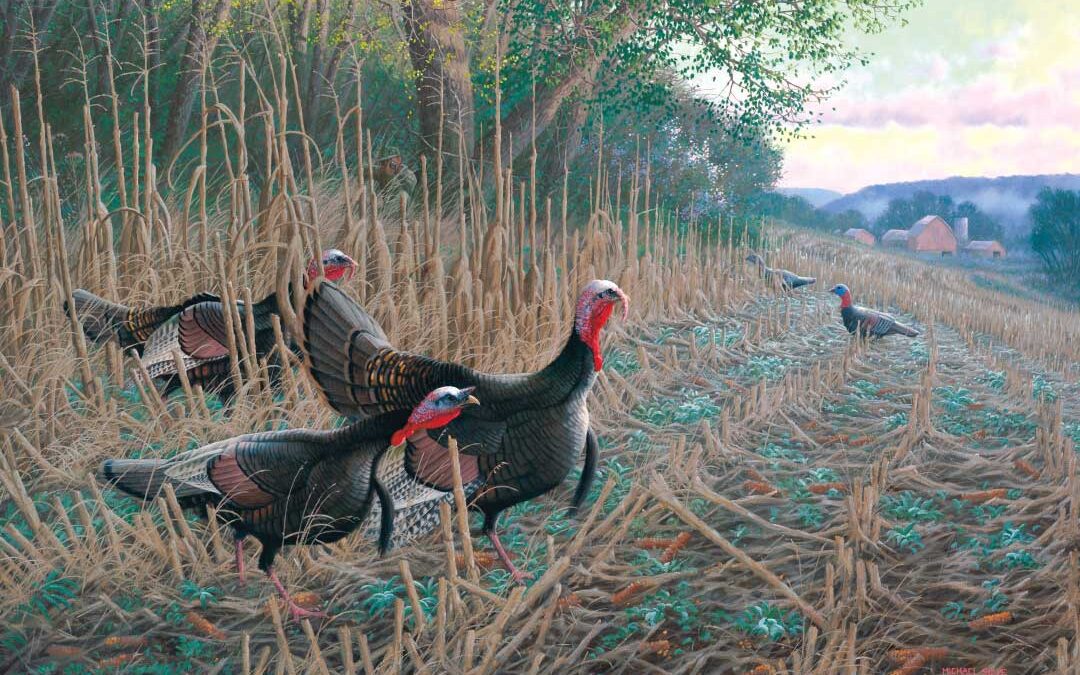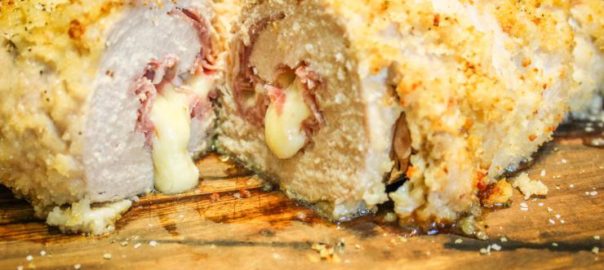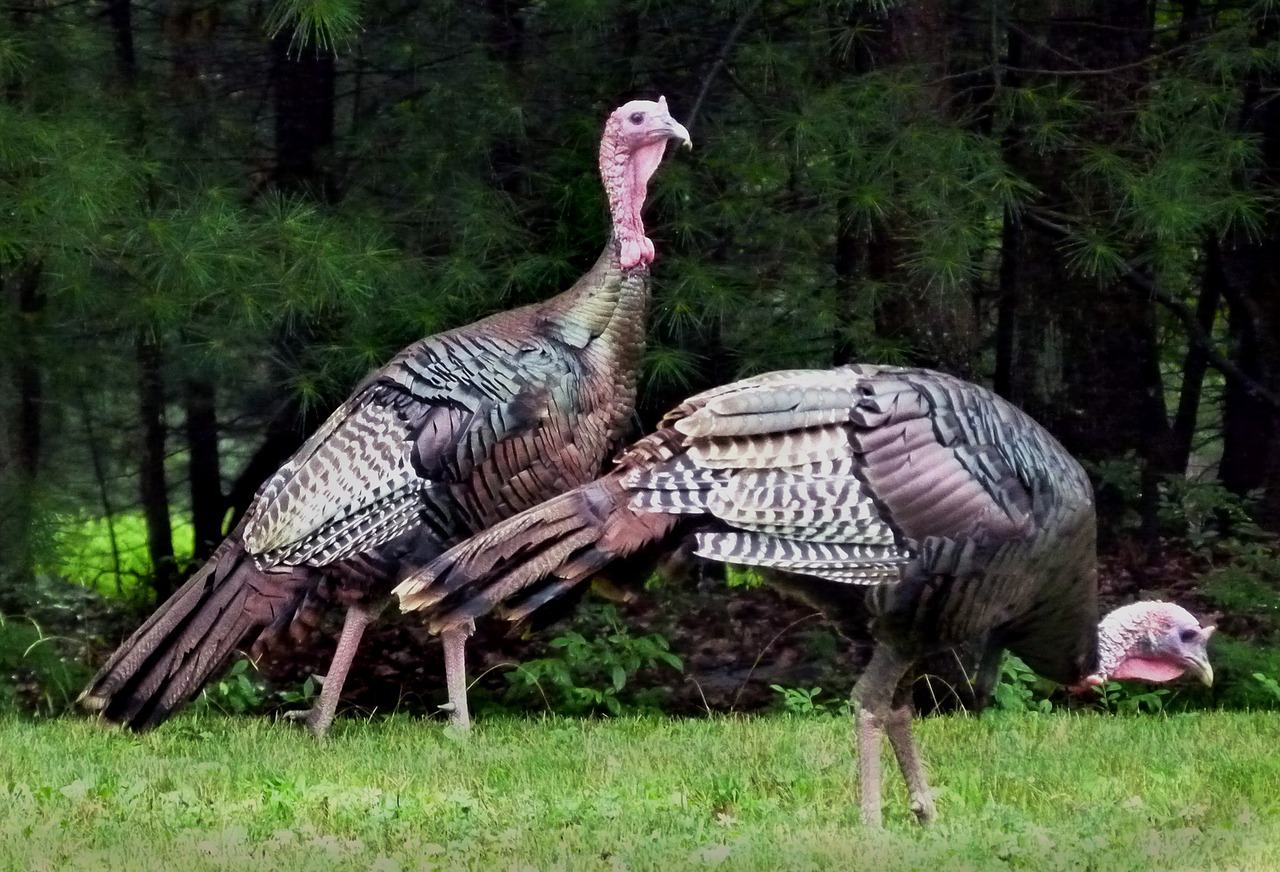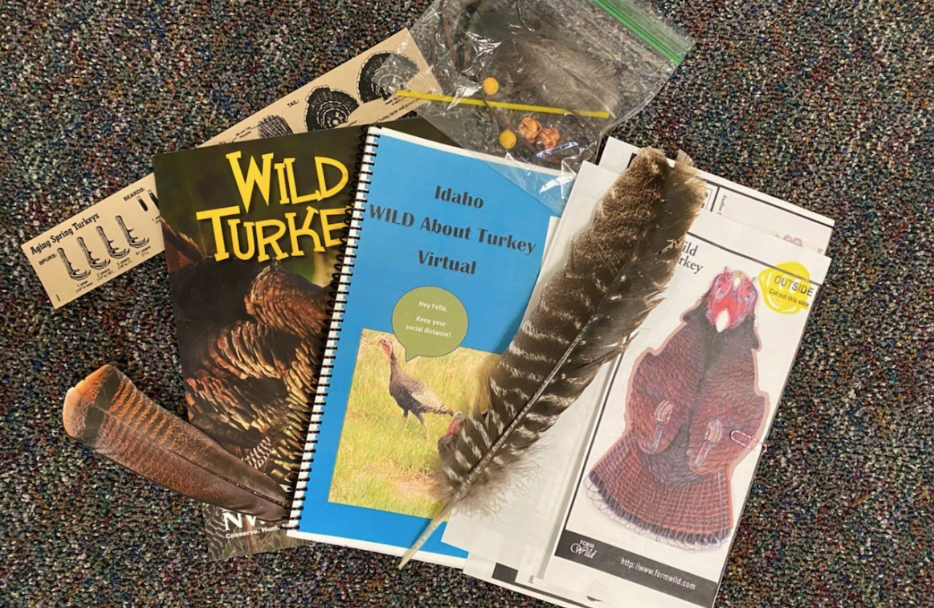The boys’ agreement with the Colonel was simple: “An hour’s work for an hour’s hunt. Pay as you go and no quitting until the season ends or you kill a turkey. Fair enough?”
A cold May morning in Michigan found Dave and me climbing trees on a field edge, hoping to ambush a turkey. Overhead, an icy-white sliver of moon laid on its back like a slice of frozen watermelon while dawn yawned sleepily behind us. There was just enough light for us to see the pandemonium that erupted on high about the time we put a foot on the second limb. Big dark birds, ungainly as dirigibles, launched loudly as if their wings were boxing our ears while others dropped to the ground and raced in a black wave into the woods.
Excited, we climbed higher, guns banging against knees and tree limbs, and prepared for the slaughter sure to come.
When it didn’t, I wiled away the morning in my imagination, paddling a canoe in the blue rivers that flowed between the clouds and wondering if the caterpillar tents were pieces of ghosts snagged by branches during the night. Newborn leaves metamorphosed into squirrel ears and white tree blossoms floated to the ground like lazy snow. Aside from a flock of geese honking bicycle horns and a couple owls asking questions, we saw no other birds of size.
By noon I motioned to Dave to descend – hungry, sore and tired from standing in the crotch of a tree, six hours of hard labor blown in a blunder.
“I didn’t hear a gobble.”
“Me neither.”
“You think we spooked them?”
“Maybe.”
“Should we tell the Colonel?”
“I’m guessing he knows.”
Neither of us knew our Osceolas from a hole in the ground but we thought we did, which may have accounted for the tugging at the corners of Colonel Croswell’s mouth a week earlier despite his gruff reputation and stern demeanor. Being boys, though, we missed the mirth and attributed his nervous twitch to time served overseas during World War II.
Spry and short, hair buzz-cut, an unlit cigar clamped in his mouth, the Colonel stuck his hands into the pockets of his fatigue jacket and frowned. You could tell he was used to giving orders.
“You say you’re hunting Osceolas?”
“Yessir, Mr. Croswell, I mean Colonel Croswell,” Dave answered meekly, “and we sort of wondered if on opening day we could shoot one on your property.”
“That’s a Monday. Your fathers know that you’re skipping school?”
“Don’t have fathers, sir, but our mothers know.” I nodded at Dave, who stood at attention as if practicing to be a private.
“No fathers, huh.”
Colonel Croswell rubbed his chin while pondering our proposal, his eyes measuring our character before wandering to an old tire swing that swayed in the wind. Behind it a line of cattle ambled single file under dark clouds as if herded by an invisible shepherd.
“You wouldn’t shoot any jakes, would you?” he asked curtly as if his words were clip-fed.
“Nope, I mean nossir. Only Osceolas.”
“I see.”
He half-smiled again, pausing to listen to the thunder of a spring squall rolling over the fields like distant shots.
“God’s gunfire,” he mused, pensive for a moment, as if somewhere else. “You’ll see the muzzle blast if the lightning gets going. God’s a hunter too, you know, which is what your fathers would tell you and what I would tell my boy if I had one.”
When his voice trailed off, an uncomfortable silence replaced it. “And what’s in it for me if I let you hunt my land?” he snapped, catching himself, his voice resuming its staccato.
“Well, sir,” I stammered, his bluntness unnerving me, “we could help you with your chores.” Dave’s eyes widened and even the Colonel seemed caught off-guard by my suggestion. Wrestling with his thoughts, he studied us for as long as it took the cows to gain the barn before speaking.
“Alright then. An hour’s work for an hour’s hunt. Pay as you go and no quitting until the season ends or you kill a turkey. Fair enough?”
Relieved, we each shook his hand, figuring in our youthful cockiness that any work would be short-lived. Little did we know.
The following morning Dave and I stood knee-deep in cow flop in Colonel Croswell’s barn, fighting flies and shoveling manure out the window onto a spreader. We were spring-cleaning stalls of a winter’s worth of dung and by midmorning our backs ached, our fingers were blistered and sweat stung our eyes. Leaning on his shovel, Dave squinted and slapped at a stink fly that approached his forehead like a landing strip. Outside the cows swung their tails lazily from side to side for the same purpose.
“I need one of those tails,” Dave grumbled. He rubbed his face until he remembered where his hands had been. “God almighty it stinks in here and to think we still have the chicken coop and the pig sty ahead of us. How much hunting have we earned so far?” he asked, arching his back.
“I’d say about a half-hour, judging by the way you’re hugging that shovel like it was your girlfriend.”
Standing cross-armed in the doorway, the Colonel startled both of us. “I hope you don’t hunt the way you work.” Despite his boot camp voice, you could tell he liked chiding us.
“Sorry, sir.” I shoveled double time and Dave went even faster, chagrin smacking both our cheeks red.
Noting our embarrassment, his tone mellowed. “You keep at it and finish this job as best you can by noon and then come on up for lunch. We’ll talk turkey then. If you’re fixing to hunt all day Monday, then I’ll turn you loose whitewashing the shed in the afternoon. If not, you’ll have a morning hunt bankrolled anyway. By the way, the pigs and chickens can wait. Too much crap in one day is no good for anybody.”
Lunch was as spartan as the Colonel’s personality and entering the kitchen, you knew to remove shoes and hats, to sit down and shut up, and to wait for the blessing to be spoken. Bread and butter, green beans, slices of cold ham and a baked potato flanked by a glass of cold milk to cool our sore fingers – no food ever looked better to two boys who had shoveled shit all morning. By the time the Colonel hit amen, we hit the ham and didn’t speak or stop until every plate and bowl was empty.
For dessert the Colonel poured himself a shot of whiskey and motioned us to the porch where he sat in a Georgia rocker that creaked like an old cavalry saddle. By now the storm had skirted the farm and headed north, leaving the tire swing motionless. Lighting his chewed cigar, he cleared his throat, spat and emptied the glass in one swallow. You could tell he had never been much of a sipper, whether lunch or life.
“At ease, boys. Sit down. Did you get enough to eat?”
“Yessir.”
“For a moment there I thought I might have to summon Christ off the mountain to keep you two in food.” When we didn’t respond, he squinted in the afternoon sun pouring onto the porch.
“Fish and loaves?” He searched our faces. “No? I suppose you boys are too big to read the Bible or attend church.” He puffed on his dead cigar, cocked his arm, and mumbled something about no fathers and wayward youth before throwing the butt into the driveway.
“So, tell me how you plan to fool old Tom.”
“We’re going to climb a tree early in the morning, one of those big oaks by the field,” Dave answered, “and shoot them when they walk by us.”
The Colonel nearly rocked up a gallop. “And what kind of guns will you be lugging up those oaks?”
“Single-shot twenty gauges and a pocketful of birdshot,” I answered confidently.
He glanced at the tire hanging in the yard and shook his head. “Like shooting a Sherman with a Daisy.”
“Sir?”
“Never mind. Head on out to the shed and I’ll show you how to whitewash without the lime burning you. I can see I’m going to get a lot of work out of the both of you.”
Truer words were never spoken. Between hunts and working chores to pay for them, our enthusiasm waned as the season dragged on. Nimrods to the bone, our hunting proved as fruitless as an apple orchard in January. Aside from the occasional grouse that sandbathed below us and mallard pairs swooping toward flooded ditches, gamebirds may as well have been four-leaf clovers. Sometimes a cock pheasant crowed his early morning love, but the turkeys had become Houdinis, escaping our declining vigilance as the weather warmed and the mosquitoes thickened.
Meanwhile, we continued to bank hunting time by learning much more about farm chores than we ever intended. Whitewashing outbuildings, shoveling pig and chicken dung, milking cows and slopping hogs, working the soil, helping with weaning and dehorning calves and castrating pigs and cows, we came to appreciate the hard but satisfying life of a farmer, despite the dearth of turkeys.
In a short time the Colonel had become the closest thing to a father that either of us had experienced, and we began to relish the relationship and the work as much as the hunt. Even with his brusque and demanding nature, there was a genuineness to him that made you want to stand taller. Praise was scant, but when it came, it made you feel like a man.
Near season’s end, after a day of plowing and tilling fields under a blue sky filled with cartwheeling seagulls, both of us taking turns after the Colonel taught us how to drive the tractor, we walked toward our bicycles. Smoking a cigar in the twilight, the Colonel beckoned to us from the porch, the cigar glowing in his hand as if he’d captured a bit of sunset. It was an unusually quiet evening when we sat down on either side of him while he rocked slowly as if remembering things past.
He gestured toward the skyline where a red sun burned warmly. “Even God enjoys a good cigar from time to time. Sharing a whiskey and a cigar with him and you boys after a hard day’s work is reverence of a high order.”
He toasted the sky and quaffed his drink before turning his attention to us. “I’ll say one thing for you two. I’ve been watching you for quite a spell now and even though you’re green as grass and wetter behind the ears than a fish in a flood, there’s no quit in you, I’ll give you that. There aren’t many boys willing to shovel manure for a crack at a turkey.”
Coming to a decision, he reached into his back pocket, pulled out his wallet and showed us an old black-and-white picture of a smiling young woman pointing at the camera with one hand while holding her swollen stomach with the other. “I’d like to think my boy would’ve. I hung that swing for him before he was to be born. Lost both of them to childbirth.”
Pausing, he studied the sunset. “I think I can take it down now. Sometimes the Lord surprises even me.”
As dusk settled across the farm, the sun glimmered beneath the horizon and a veiled moon shone above, nightlights for our ride home.
Returning the picture to his back pocket, the Colonel sighed, as if a burden had been lifted, and dropped his guard, no longer doubting the decision he had made the first day he met us.
“Your fathers would be proud of you. Someday you’ll make good men and maybe even good hunters . . . with a little help from an old turkey hunter.” He cocked an eyebrow, his eyes glinting like he knew something we didn’t. “You still game for tricking old Tom?”
We nodded like grinning fools. You could tell he had been waiting for this moment for a long time.
“Alright then, let’s get down to brass tacks. You’re not hunting Osceolas, you’re hunting the Eastern turkey. You don’t shoot bird-shot, you shoot high brass at birds this big. And you don’t climb trees like Jack and the Beanstalk, for chrissakes! Hunting done right is preparation, perspiration and perseverance.
“You took out a patent on the last two but skipped the most important one. First you scout, then you hunt. A turkey’s a creature of habit just like you. He sleeps, he eats and he chases girls. Find his bedroom, his kitchen and his girlfriends, and you’re a shot shy of Thanksgiving dinner. Savvy?”
Moving his hands up and down, the Colonel’s cigar looped through the night air like a sparkler in a kid’s hand on the Fourth of July.
“Colonel,” Dave asked uncertainly, “how will we know a rooster from a hen?”
The Colonel laughed. “You’ll recognize him by the Indian chief war bonnet he wears on his behind and his red, white and blue head snapping like a flag at a parade. He’ll be sporting a beard like an Amish elder and his chuckle will remind you of someone’s crazy aunt locked in the back room away from company. Make a sound close to chalk on a blackboard and he’ll come strutting like the King of England on a camel and gobbling like a damn stooge. Trust me, boy, you’ll know.”
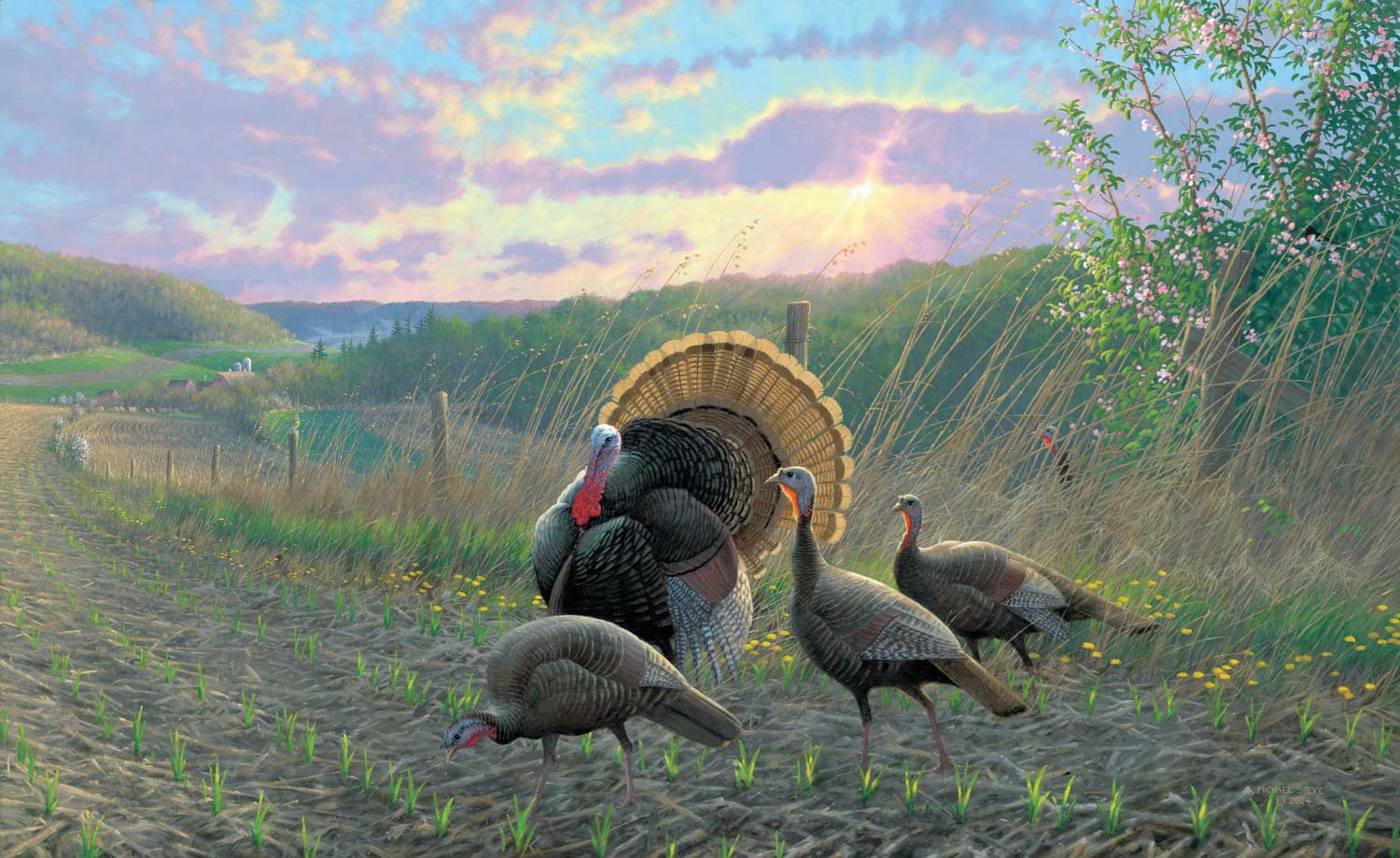
Golden Fan Club by Michael Sieve
At dawn the Colonel positioned us side-by-side, doubling our firepower, behind a fallen oak surrounded by a mix of towering pines and hardwoods that bordered a field. Orders were strict and succinct.
“Don’t move, aim for the head, both shoot the same bird, and don’t shoot just any Tom, Dick, Harry or Jake. No bearded ladies either.”
“Bearded ladies?” I asked.
“Hens with beards. It happens.”
“Oh.”
“And remember, a turkey looks about as quick as slow motion, but the fact is, he has duck speed in the air and dog speed on the ground. Miss him once and twice probably won’t happen. Hell, a turkey could just about whip the shorts off of Jesse Owens.” Looking at our blank faces, he shook his head. “Never mind.”
Snapping off words like a turret gunner, the Colonel abruptly stopped and reached inside his coat and pulled out a long, green frond. “This, boys, is my turkey harmonica. You put this between your thumbs and play it like you’re searching for a fiddle and a band. Watch.”
Demonstrating, he put it to his mouth and blew something sounding like flatulence. “Old Tom can’t help but come dancing a two-step trying to find his new girlfriends. Fools him every time. I can do it with a wingbone and a maple whirligig too.”
Catching disbelief rippling across our faces into a pool of grins, he shook his head in disgust. “Why you doubting Toms,” he laughed. “I’ve tricked enough turkeys with this thing to feed Jamestown before you whippersnappers were even born! You’ll see.”
“Yessir,” I mumbled while Dave stifled a guffaw.
Stationing himself 20 yards to our right, the Colonel struck up a cacophony of yelping and purring and chirping that would irritate the smell off a skunk.
“What’s that supposed to be?” Dave whispered.
“A hen?” I shrugged.
“If you asked me, we’d be better off singing Turkey In The Straw . . . or yodeling.”
No sooner had the words left Dave’s mouth when the parade came into view. Fifty turkeys if there were one, a flock of hens stilting past us chased by distant, querulous voices. Crazy aunts, I thought.
“Don’t move!” I hissed, as three gobblers traipsed toward us, deceived by the Colonel’s gobbledygook. The largest was flanked by two smaller ones, as if he were the officer in charge, beard hanging from his chest like a pony’s tail. Strutting, his tail-feathers flared out into geisha girl fans, the trio neared shotgun range.
Lifting our guns slowly, we put a bead on the big one before he put a beady eye on us. Closing in a strut, he surged ahead of the other two.
POW!
The birds bucked and bolted every which way for cover, some in the air and some on the ground and all in a panic, a melee of wings, dust, noise and leaves. In the commotion, I lost sight of the big turkey. Clean miss, I figured, fumbling to reload.
“Hold your fire, boys,” the Colonel ordered. “He’s down. Congratulations on shooting one damn fine turkey.”
With its glossy bronze wings and coppery-brown, iridescent body, you would have thought the bird had been mined from the earth. Dave and I traded turns holding it over our shoulders while the Colonel took our pictures, ones he would carry for the rest of his life.
Stroking the chocolate-colored tail-feathers, in that moment we felt like we had become hunters and men, especially when the Colonel pulled out the bottle with the bird on it and poured each of us a shot. The label read “Wild Turkey Bourbon Whiskey” and even though it burned our throats like hot coals, we drank it down fast, just like the Colonel.
“To tomfoolery,” he said, joy suffusing his face, while offering a toast that we would offer for years to come in his memory.
It was one of the best days of my life.
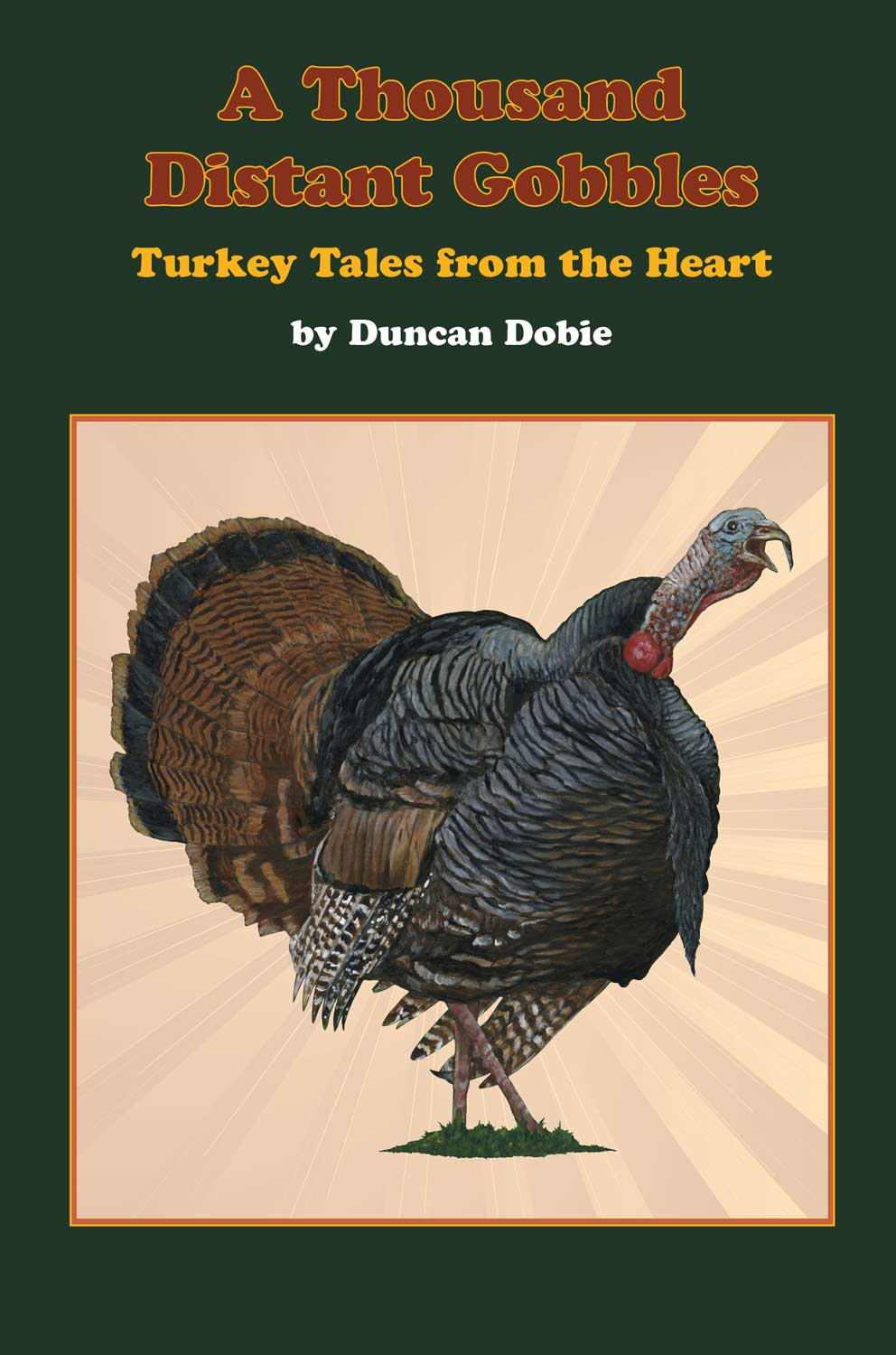 Southern storytelling at its best, A Thousand Distant Gobbles is a celebration of turkey hunting through the eyes of some unforgettable and passionate characters who live for opening day of turkey season. Heartwarming, powerful, compelling – the eight short stories and eight turkey vignettes found inside these pages will warm your heart and take you on an unforgettable adventure into the spring turkey woods. Buy Now
Southern storytelling at its best, A Thousand Distant Gobbles is a celebration of turkey hunting through the eyes of some unforgettable and passionate characters who live for opening day of turkey season. Heartwarming, powerful, compelling – the eight short stories and eight turkey vignettes found inside these pages will warm your heart and take you on an unforgettable adventure into the spring turkey woods. Buy Now
